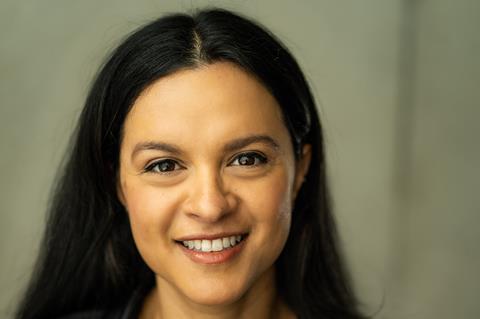In her first sit-down interview as the new director of Film4, Farhana Bhula discusses her plans for the UK public funder.

Farhana Bhula, Film4’s head of creative since 2023, was appointed interim director of Channel 4’s inhouse feature film division in July following the announcement that Ollie Madden was leaving the UK broadcaster to become director of UK film at Netflix. She was confirmed as Film4’s eighth permanent director at the start of September.
Bhula seemed a shoo-in to follow in the footsteps of David Rose, David Aukin, Paul Webster, Tessa Ross, David Kosse, Daniel Battsek and Madden, but the executive reveals it was an uncompromising near-two-month process. “Even though I was doing the job after Ollie’s announcement, I wasn’t complacent,” she says, in her first interview in post. “The channel did run a rigorous process, and it felt good because I had to present a clear vision. I had to do my homework and really think about what I wanted to do in this role. I’m glad we did it, but I’m also glad it’s over.”
Film4’s new director may only officially be a month into the role, but she is not wasting any time in setting out her ambitions for the UK funder. One area Bhula is keen to focus on is helping directors and producers make the often-seismic shift from first to second feature — “especially those from female or diverse directors. That is a live goal and something we are proactively working on.”

Film4 is developing second features with Pretty Red Dress director Dionne Edwards and Earth Mama’s Savanah Leaf. After backing Rose Glass’s first two features, the funder is planning to work on her third. Bhula is executive producing Molly Manning Walker’s next project, a TV series set up at Channel 4 and produced by A24 called Major Players, after Film4 backed her debut How To Have Sex.
Bhula is also laser-focused on youth audiences. “I’m very interested in the resurgence of under-25s at the cinema,” she says. “There seems to be a new generation of cineastes, people going to the cinema because it’s a distraction-free zone, people discovering cinema through things like Letterboxd. I want to make sure Film4 and our output connects with that audience, across the breadth of our slate… It feels to me there is a generation of cineastes under 25 who maybe don’t know the Film4 brand.”
Development slate
In the short term, hiring a new senior commissioning executive is a priority, and she confirms an internal and external recruitment process is underway.
The aim to back 10-12 features per year with production funding, including around four debuts, with a development slate of about 120 projects, remains intact, although it is not an exact science. “Our development slate is more than 120 [projects] right now,” she notes.
Although Channel 4 is a public service broadcaster, it is funded by commercial revenue. In 2024, Film4’s annual budget from its parent dropped by 10%, to $30m (£22.5m). It has now dropped down further, to $26.9m (£20m). Since the government abandoned plans to privatise Channel 4 in 2023, the broadcaster has been undergoing a significant restructure that saw Madden also become head of the drama commissioning team in 2024; Bhula’s role will remain confined to the channel’s features unit.
Profits from the higher-budget, bigger-swing projects continue to help the funder support the riskier debuts. The aim to be financially self-sufficient, outlined by then-Film4 head Battsek in 2019, has not been achieved, but Bhula confirms it “remains the goal”.
Five of the 10 best-performing UK independent films at the 2024 global box office were co-financed by Film4: Jonathan Glazer’s The Zone Of Interest, John Crowley’s We Live In Time, Thea Sharrock’s Wicked Little Letters, Andrew Haigh’s All Of Us Strangers and Glass’s Love Lies Bleeding.
Ambitious, commercially minded projects in the works include Martin McDonagh’s Wild Horse Nine, produced by Searchlight Pictures and Blueprint Pictures, which shot earlier this year on Chile’s Easter Island, plus features from Aoife McArdle, a writer/director on Apple series Severance, and Polish filmmaker Pawel Pawlikowski.
On the debut side, Film4 is working with a range of filmmakers who Bhula says are the “best in class in their disciplines”.
Molly Manners, a director on Netflix series One Day, is in post on her Film4 and BFI-backed feature Extra Geography, produced by Brock Media and written by Miriam Battye, whose credits include Succession. Production has commenced in the UK and Greece on Normal People writer Alice Birch’s directorial debut Sweetsick, starring Cate Blanchett, for House Productions and Searchlight Pictures.
Film4 is also developing features with theatre writer/director Bijan Sheibani, award-winning poet Caleb Femi and director of BBC series Ladhood Jonathan Schey. The high-budget shorts programme Future Takes, which Film4 co-finances with the BFI and has recently launched its second cycle, led Film4 to back the development of features from participants including Rashida Seriki and writer/director team Luis Hindman and Sufiyaan Salam.
Finding collaborators
A rigorous development process helps Film4 make money go further. “Development is everything,” insists Bhula. “By focusing on development, it means that we have strong projects we can take out to market to then collaborate with partners. We don’t fully finance, and that means we’re not developing things in a vacuum. It means that we’re developing with an eye to what’s feasible, and what’s going to find collaborators in the marketplace.”
Not everything Film4 backs at production stage came through its development process, although the funder prefers to develop debut features in-house. Kaouther Ben Hania’s Venice Silver Lion grand jury prize winner The Voice Of Hind Rajab, for instance, came to Film4 through UK producer James Wilson already formed.
Film4 and BBC Film’s respective financing of two Cannes Competition titles, South African filmmaker Oliver Hermanus’s The History Of Sound and Norwegian Joachim Trier’s Sentimental Value, sparked controversy earlier this year owing to a lack of involvement from a UK filmmaker or UK production company, at a time when UK producers are scrambling for financial support. More than 200 producers signed a petition asking for the funders to reaffirm their commitment to the UK production sector.

“The History Of Sound was an interesting one,” reflects Bhula. “We have a long relationship with Oliver, he is constantly making projects out of the UK and working with UK producers. There was a natural connection. That being said, we heard the feedback in your piece [Screen International’s coverage]. We took that on board, and we took it very seriously.”
Producer fee deferrals is still a sticky topic for the industry, although Film4 appears to be faring better than its public funder counterparts. According to the Producers Roundtable survey of 107 UK producers, published in May, 49% of producers on BFI-backed feature films have deferred their fees, 36% on BBC Film-backed titles and 18% on those backed by Film4.
“It’s not something we are pushing for or encourage,” stresses Bhula. “Making sure the projects are budgeted sensibly, and the feasibility is built into them as early on as possible [is our recommendation].”
AI is not currently being used by Film4 to speed up processes, such as submission reading, and so cut costs. “We don’t use it for reading, and I think that’s partly because we’re so driven by identifying new voices, it would be hard to hand that over to AI,” she says. “Where it’s a tool that’s helping you to draft papers or emails, I’m sure that’s being used across the channel.”
Regional outreach
A further area of focus for Film4 is to create meaningful relationships with filmmakers and producers across every corner of the UK. Executives in the creative team each take ownership of a region — scouting for talent, building relationships and visiting their patch several times a year. It is a structure that was brought in over the past year as part of a Channel 4-wide initiative to connect commissioners with nations and regions.
“We are constantly trying to make sure we have greater visibility in the nations and regions,” confirms Bhula. Senior commissioning executive David Kimbangi focuses on Scotland. Development and production executive Amy O’Hara, who is based in Channel 4’s Leeds office, leads on the north of England and the Midlands. O’Hara’s two fellow development and production executives, Alice Whittemore (a former BFI Network Welsh talent manager) and Max Park, cover Wales and Northern Ireland respectively. Bhula leads on southwest England, having grown up locally in Gloucester.
Bhula’s first taste of the industry was launching Watersprite Film Festival while at the University of Cambridge. After graduating with a BA in modern languages in 2008 and then an MPhil in European literature in 2010, she took a few corporate jobs but kept coming back to film. Bhula had stints at Wildgaze Films and Endor Productions before joining the BFI Film Fund in 2019 as a development and production executive.
She came on board Film4 in January 2022, first as senior commissioning executive, later becoming head of creative and deputy director.
Channel 4 is, at time of writing, yet to appoint a chief executive to replace Alex Mahon, who left in the summer. Bhula currently reports to chief commercial affairs officer Martin Baker but this may change once a full-time CEO is appointed.
She speaks fondly of a solid network of support in the wider industry, notably having a “good rapport” with public funder heads Mia Bays at the BFI Filmmaking Fund and Eva Yates at BBC Film.
And what pearls of wisdom have her Film4 predecessors passed on? Madden, Battsek — now president of Film At Lincoln Center — and House Productions founder Tessa Ross have hit a similar note. “They have all been incredibly generous with their expertise,” says Bhula. “Each, in their own way, has imparted to me the importance of protecting the integrity of the Film4 brand and how that brand has been built up over many years.
“With all the decisions the Film4 team makes, we need to make sure we are serving the UK industry. But also protecting the Film4 brand.”
















![[L-R]: Amanda Villavieja, Laia Casanovas, Yasmina Praderas](https://d1nslcd7m2225b.cloudfront.net/Pictures/274x183/6/4/1/1471641_pxl_20251224_103354743_618426_crop.jpg)








No comments yet